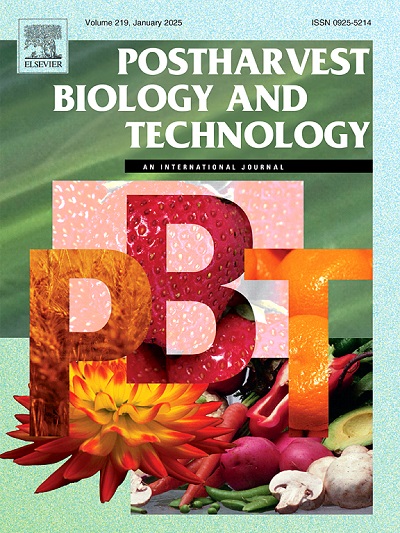Ethylene-induced MdDof1.2 activates MdAMY1 to promote starch degradation in post-harvest apple fruit
IF 6.4
1区 农林科学
Q1 AGRONOMY
引用次数: 0
Abstract
Starch degradation is a critical physiological change that occurs during the postharvest storage of apples, significantly affecting fruit quality. Ethylene, a key hormone in climacteric fruits, is known to promote this process. However, the underlying mechanism remains poorly understood. This study aimed to elucidate how ethylene mediates starch degradation in apples by focusing on its role in regulating specific gene expression. Using ethylene treatment and gene expression analysis, we identified two key genes, MdAMY1 and MdBAM8, that are upregulated during apple storage. In addition, we discovered a DOF-type transcription factor, MdDof1.2, whose expression is induced by ethylene. Functional assays demonstrated that MdDof1.2 directly binds to the promoter of MdAMY1, enhancing its transcription. Overexpression of MdDof1.2 in apple fruits significantly increased MdAMY1 expression and accelerated starch degradation during storage. These findings reveal a novel gene regulatory network in which ethylene regulates starch metabolism through transcriptional activation of key genes. This study provides new insights into the molecular mechanisms underlying postharvest fruit metabolism, with potential applications for improving storage strategies and extending fruit shelf life.
乙烯诱导MdDof1.2激活MdAMY1促进苹果收获后淀粉降解
淀粉降解是苹果采后贮藏过程中发生的重要生理变化,对果实品质有重要影响。乙烯是更年期水果中的一种关键激素,它促进了这一过程。然而,其潜在的机制仍然知之甚少。本研究旨在通过关注乙烯在调节特定基因表达中的作用来阐明乙烯如何介导苹果淀粉降解。通过乙烯处理和基因表达分析,我们鉴定出两个关键基因MdAMY1和MdBAM8在苹果贮藏过程中表达上调。此外,我们还发现了一个由乙烯诱导表达的dof型转录因子MdDof1.2。功能分析表明,MdDof1.2直接结合MdAMY1的启动子,增强其转录。苹果果实中过表达MdDof1.2显著提高了MdAMY1的表达,加速了贮藏过程中淀粉的降解。这些发现揭示了一个新的基因调控网络,其中乙烯通过转录激活关键基因来调节淀粉代谢。该研究为研究果实采后代谢的分子机制提供了新的见解,在改善贮藏策略和延长水果保质期方面具有潜在的应用价值。
本文章由计算机程序翻译,如有差异,请以英文原文为准。
求助全文
约1分钟内获得全文
求助全文
来源期刊

Postharvest Biology and Technology
农林科学-农艺学
CiteScore
12.00
自引率
11.40%
发文量
309
审稿时长
38 days
期刊介绍:
The journal is devoted exclusively to the publication of original papers, review articles and frontiers articles on biological and technological postharvest research. This includes the areas of postharvest storage, treatments and underpinning mechanisms, quality evaluation, packaging, handling and distribution of fresh horticultural crops including fruit, vegetables, flowers and nuts, but excluding grains, seeds and forages.
Papers reporting novel insights from fundamental and interdisciplinary research will be particularly encouraged. These disciplines include systems biology, bioinformatics, entomology, plant physiology, plant pathology, (bio)chemistry, engineering, modelling, and technologies for nondestructive testing.
Manuscripts on fresh food crops that will be further processed after postharvest storage, or on food processes beyond refrigeration, packaging and minimal processing will not be considered.
 求助内容:
求助内容: 应助结果提醒方式:
应助结果提醒方式:


